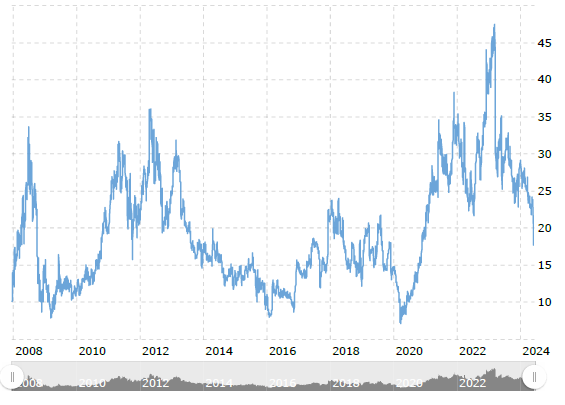Why Titan Machinery $TITN is a founder-led midwestern value cyclical.
My least degenerate position at the moment.
I am always on the lookout for uncorrelated cycles in the vain hope that someday I will be able to take profits from one position and plow them into another in a world where they are not all up or down at the same time. That is hard to find when I restrict myself to industries that I can understand. Agriculture has always interested me, but there are a surprisingly small number of public companies in the space compared to other industries of a comparable size.
Titan Machinery (TITN) is primarily a farm equipment but also a construction equipment dealership business, and like a car dealership, parts and service are an important part of the story. Unlike a car dealership, rentals are an important part of their business because often a farmer wants to take the model for more than just a test drive before making such a large investment.
TITN is a founder-led midwestern agricultural industrial company, and they just implemented their succession plan; day to day control was handed over to a hand-picked successor, but the founder is still the chairman. The new CEO has an entrepreneurial background, he paid his way through college by creating a landscaping company, and spent his entire career post college at TITN. I always try to determine if management is capitalist / entrepreneur, or manager / bureaucrat, and in this case I am confident that they are entrepreneurial capitalists.
TITN has little moat to speak of except for continued operational performance and brand recognition. Personally, I would rather have a business run by a capitalist with a weak moat than a business run by a bureaucrat with a strong moat. But that is my bias.
The supply chain disruption surrounding Covid hit more sophisticated machinery exceptionally hard. TITN over-earned last year due to the bullwhip effect as pent up orders were finally able to be filled. The stock price has taken a large downturn recently as business is not only normalizing, but agricultural commodity prices have been in a downturn for the last two years from the highs of the Ukraine war. It does look like agricultural commodities have just inflected, but now farmers have to contend with high interest rates.
For the agricultural machinery business, their cycle should lag the agricultural commodity cycle, because farmers need a couple of good years of high prices to be flush with cash in order to buy new equipment. Alternatively, a temporary dip in interest rates combined with high agricultural land prices could bring in a rush of buyers trying to take advantage of low rates and betting the farm to finance their purchases.
TITN, through their construction equipment segment, might end up being a beneficiary of the infrastructure buildout as well as the artificial intelligence data center boom and grid renovation. I’m not holding my breath, but it is worth noting the possibility.
TITN is growing both organically and inorganically recently through an acquisition of an Australian competitor. The growth is not stellar, about 4.2% annual increase in gross profit from the prior peak in 2013 to now, and not in a straight line.
Gross Profit:
Stock Price:
From where things stand now, it looks like the next peak in the agricultural machinery cycle is at least three or more years away. However, from these prices, TITN should at least double to between $40 to $60 a share if their peak earnings ($6+) coincide with peak multiples (P/E 10+), as happens in cyclicals as tourists pile into value traps at the top of the cycle. This is probably one of my least degenerate positions, but a 3-5 year 2x - 3x on an uncorrelated cycle with a founder-led midwestern agricultural industrial business is pretty enticing to me.
I have little confidence that the stock price has bottomed, and while I don’t mind catching falling knives, I don’t believe there is any rush to accumulate shares here. I have sized the position small with the intention of buying dips over the next two years. I have learned the hard way that every small cap that has the potential to double also has the potential to halve. But I hope you can see from the share price volatility, the cyclicality, and the growth, I think this is a perfect addition to a concentrated small cap value portfolio for an active manager to take advantage of the cyclicality and buy the weakness and sell the strength potentially at times when their other positions are uncorrelated.







